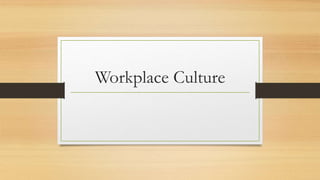Workplace Culture in Step by Step
- 2. What is a Workplace Culture? • According to Edgar Schein workplace and organisational culture can be defined as • “a pattern of basic assumptions that the group learned as it solved its problems of external adaption and internal integration, that has worked well enough to be considered valid and, therefore, to be taught to new members as the correct way to perceive, think and feel in relation to those problems.” • (Schein, 1985, p. 9)
- 3. Where is a Workplace Culture Found? • According to Peterson (2002) a workplace culture can be found in every organisation. • Much research has been conducted on the theory of workplace cultures including the work of: • Martins and Martins • Arnold • Schein • Brown • Harrison
- 4. What are the Functions of Workplace Culture? • Brown (1998) suggests that workplace culture can • Reduce Conflict • Regulate • Reduce Doubt • Motivate • Encourage Competitiveness
- 5. My Views Prior to Internship • Prior to beginning my internship, I was concerned that I may find difficulty in adapting to the workplace culture of the organisation as it was a new and unfamiliar environment. • I worried that I may have different values and morals to those of the organisation and that this may inhibit my learning experience. • I believe the hardest part of adapting to the workplace culture of a learning organisation, is to understand the perceptions within the organisation and what drives particular behaviours, as these are not clearly established in written documents such as mission statements .
- 6. The Workplace Culture in Step by Step • I found the atmosphere in Step by Step very easy going, particularly in the morning time. • Typical mornings would consist of the project workers working on their computers planning and evaluating the programmes. • Lunch time could be taken at any time you wished for an hour – this was very new to me having come from college with set lunch times and my part- time job with rostered breaks
- 7. (cont.) • The atmosphere was also very open and inviting in Step by Step • I felt comfortable to state my opinions and to ask many questions even though I was new into the work place • When problems arose within the project, my supervisor would discuss the issues with me, what actions were going to be taken and why. This helped me to deepen my understanding of the process of problem solving used in Step by Step and I tried apply this process when other problems arose.
- 8. Reflection after Completing Internship • Overall from my experience in Step by Step I have seen that many organisations have different ways of dealing with issues. • I was able to compare the process used for problem solving in Step by Step to those I have experienced elsewhere in my life such as my part-time job and college. • I have learned that it is important to be open and adaptable to new ways of working. • I also believe I should appreciate others opinions and acknowledge that there may be an easier or better way of doing things.
- 9. References • Brown, A. (1998). Organisational Culture. London: Financial Times Pitman Publishing • Peterson, K. D. (2002). Positive or Negative. Journal of Staff Development, 10-15. • Schein, E. (1985). Organizational Culture and Leadership: A Dynamic View. San Francisco: Jossey-Bass.
